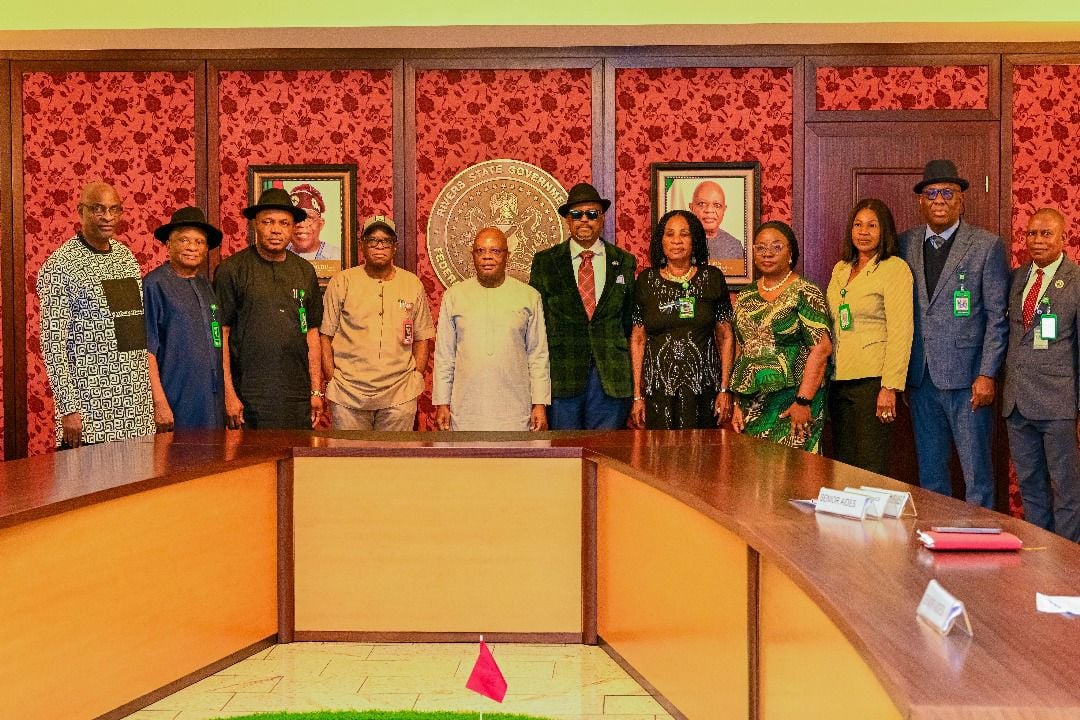As preparations for the 2027 general election intensify, the Independent National Electoral Commission (INEC) and the Nigeria Police Force have cautioned political parties against engaging in premature campaigns, warning that such actions contravene the electoral law.
INEC chairman Mahmood Yakubu expressed concern that despite legal restrictions, several parties have already commenced subtle forms of campaigning, even though the law only permits such activities 150 days before the election.
The situation has sparked strong reactions within the political space. Former INEC chairman Attahiru Jega called for decisive action to stop the practice, while opposition parties — the Peoples Democratic Party (PDP) and the African Democratic Congress (ADC) — accused the ruling All Progressives Congress (APC) of being the chief violator. The APC, however, supported INEC’s stance, as the Inspector-General of Police, Kayode Egbetokun, promised to enforce the law against offenders.
Speaking on Wednesday, Yakubu criticised the growing incidents of early campaigns nationwide, describing them as a direct violation of electoral rules and a danger to Nigeria’s democratic process.
He assured that the commission would work closely with the National Assembly and political stakeholders to amend the Electoral Act, so as to empower INEC with the legal authority to penalise violators.
Speaking at a one-day roundtable on the challenges of early political campaigns, held at the Electoral Institute in Abuja on Wednesday, Yakubu highlighted what he described as a “disturbing trend” of political campaigning ahead of scheduled timelines, especially in relation to upcoming off-cycle governorship elections, the Federal Capital Territory Area Council elections, and the 2027 general election.
He referenced Section 94(1) of the Electoral Act 2022, which clearly prohibits the commencement of campaigns earlier than 150 days before polling day, and requires all campaign activities to end 24 hours before voting begins.
However, he lamented that political actors often disregarded this provision. “Political parties, candidates and their supporters seem to be perpetually in election mood even when the Electoral commission is yet to release the Timetable and Schedule of Activities for elections.
“Around the country, we have seen outdoor advertising, media campaigns and even rallies promoting various political parties and candidates,” the INEC Chairman noted.
Yakubu warned that these premature activities severely compromise the commission’s ability to enforce campaign finance limits.
“These actions and activities undermine the commission’s ability to track campaign finance limits as politicians, prospective candidates and third-party agents expend large amount of money that cannot be effectively monitored before the official commencement of campaigns,” he said.
He noted that while Nigerians expected INEC, as the regulator of political parties, to act, the commission’s powers were constrained by gaps in the legal framework. “The major challenge for the commission is the law itself,” he noted.
Although Section 94(2) of the Electoral Act 2022 imposes a maximum fine of N500,000 for campaigning within 24 hours of an election, Professor Yakubu pointed out that “there is no sanction whatsoever concerning breaches for campaigns earlier than 150 days to an election.
“Here lies the challenge for the commission in dealing with early campaign.”
He acknowledged that early campaigning is not a new issue, but said the failure of regulatory bodies to address it within existing legal constraints necessitated deeper reflection.
“The seeming inability of the commission and other regulatory agencies to deal with the menace within the ambit of the existing electoral legal framework calls for deep reflection,” Yakubu said.
“With the National Assembly currently reviewing our electoral laws,” Yakubu said, “the commission has also invited the leadership of both the Senate and House of Representatives Committees on Electoral Matters.
“I am confident that they will give due consideration to actionable recommendations by experts,” the INEC chairman added.
He also acknowledged the participation of regulatory agencies, including the National Broadcasting Commission, the Advertising Regulatory Council of Nigeria, and the Broadcasting Organisation of Nigeria, expressing optimism that the discussions would yield practical solutions.
INEC’s warning comes as political actors are already being accused of heating up the polity ahead of the 2027 general elections.
The rising political activities across the country has raised mixed feelings among many Nigerians. This is as the 2027 general election is still more than a year away.
Subtle campaigns have begun, especially in party centres in the Federal Capital Territory, Abuja, and Lagos, with politicians hosting large gatherings and displaying posters, while the media and social platforms are saturated with campaign messages.
Nigeria’s four-year electoral cycle is increasingly marked by early campaign build-ups, often shifting attention away from governance as politicians focus more on electioneering than service delivery. This trend has become more pronounced with each cycle, raising concerns about its impact on leadership and accountability.
Historically, premature campaigns have heightened political tension and division. Ahead of the 2023 elections, similar worries emerged as political rhetoric dominated national discourse months before INEC officially commenced campaign activities, with many of those actions going unchecked due to weak legal sanctions.
Police wades in
In a related development, in Abuja on Wednesday, the Inspector General of Police, Kayode Egbetokun, addressed the growing tension surrounding early political mobilisation and social media-driven advocacy, insisting that the police would enforce laws guiding compliance.
Egbetokun questioned whether traditional regulations on campaign timing were still effective or necessary in today’s rapidly evolving media environment.
“I think there is one very important question that we need to ask, do we really need to continue to regulate campaigns in 2025?” he asked during the forum.
He further elaborated on the responsibility of the police force in upholding laws passed by the legislature, regardless of the context in which they are applied.
“Based on the fact that there is a need to bridge the gaps between our leaders and the communities and the citizens, that’s one. Then two, every law that is made, as a law enforcement agency, we have a duty to enforce these laws,” Egbetokun said.
The IGP encouraged stakeholders at the roundtable to reflect on the broader implications of these laws on national development and security.
“And then we need to ask ourselves again, what are the relevance of these laws to issues of security and development? That is the question I want to throw to speakers and participants for us to seriously look deep into.”
Despite the challenges, Egbetokun assured that the Nigeria Police would continue to perform its constitutional role in maintaining law and order during the electioneering period.
“Having said that, the Nigeria Police Force will continue to enforce every law that has been duly passed by the Senate, House of Assembly, House of Representatives as well,” he stated.
“And we will continue to do everything needed to be done to ensure that campaigns go on peacefully at any time, at anywhere it is taking place, and we also ensure to provide adequate security for every election at any location and irrespective of the time.”
Ex-INEC boss reacts
In his remarks, former INEC chairman, Prof. Attahiru Jega, urged Nigerian authorities to implement stricter penalties and strengthen enforcement mechanisms to tackle the growing trend of premature election campaigns ahead of the 2027 general elections.
Speaking at an INEC Roundtable on “The Challenges of Premature Campaigns” held in Abuja on Wednesday, Jega highlighted the urgent need for reform within the electoral legal framework.
He called for clearer definitions of campaign-related offences and the imposition of firm punitive measures to deter violations.
Jega expressed concern over the increasing involvement of third-party groups often acting on behalf of political candidates and parties in campaign activities that breach the legal timeline.
According to Jega, these groups often engage in unauthorised political advertising, campaign billboards, and media promotions well before the legal campaign window opens.
He stated, “All candidates and their parties, and especially incumbent office holders and their political parties, should be vicariously held responsible and penalised for premature campaigns for them by third-parties.
“All election campaign offences, especially premature campaign offences, should be carefully defined, stiff penalties specified, and strictly applied where applicable.”
Jega also urged anti-corruption agencies, including the Economic and Financial Crimes Commission and the Independent Corrupt Practices and Other Related Offences Commission, to intensify scrutiny of the funding behind these third-party campaigners.
He noted that many such groups are suspected of operating with illicit financing, in violation of campaign finance laws.
“EFCC and ICPC should pay special attention to third-party campaigners and thoroughly interrogate their sources of funding,” Jega urged.
Beyond enforcement, Jega emphasised the need to consider third-party spending when calculating whether candidates have exceeded legally allowed expenditure limits.
“In determining whether candidates and parties expenditures fall within approved limits, the estimated/determined expenditure by a third-party campaigner for the candidate/party should be taken into consideration,” he said.
In light of persistent violations, Jega also reiterated the need for structural reform through the establishment of a specialised Election Offences Commission and Tribunal to investigate and prosecute electoral offences.
“The recommendation for the establishment of Elections Offences Commission and Tribunal has become even more urgent and important for consideration, and should be addressed in the next/current round of electoral reforms before the 2027 elections,” he said.
Jega criticised the widespread disregard for Section 94(1) of the Electoral Act (2022), which restricts the start of campaigns to 150 days before polling day and mandates their cessation 24 hours before the election.
The former INEC chairman warned that such early campaigning not only undermines legal provisions but also distorts the political playing field, entrenches impunity, and contributes to political instability.
“Premature election campaigns are undesirable aberrations in democratic elections, posing serious challenges to the integrity of elections,” he said.
He further noted that the use of public resources by elected officials for self-promotion under the guise of project commissioning or public service achievements creates unfair advantages and fosters a cycle of illegality.
According to Jega, unchecked early campaigning stokes political tensions, fuels ethno-religious divisions, and threatens democratic stability.
He concluded by urging policymakers and electoral stakeholders to prioritise reforms that would strengthen Nigeria’s democratic processes ahead of the 2027 elections.
Meanwhile the Presidency insisted that it remained committed to lawful electoral processes and would not encourage unlawful campaigns from supporters of President Bola Tinubu and Kashim Shettima.
A presidential aide, who spoke on condition of anonymity, referred one of our correspondents to its earlier stance on the issue.
On April 14, 2025, the Presidency disowned billboards and other materials promoting the 2027 campaign for President Tinubu and Vice President Shettima nationwide.
“We urgently call on individuals and groups funding this 2027 political campaign through the ongoing deployment of materials on billboards nationwide to cease immediately,” it said in a statement signed by Tinubu’s Special Adviser on Information and Strategy, Bayo Onanuga.
The statement was titled ‘Presidency Disclaims 2027 Campaign Billboards Nationwide.’
Onanuga said, “The Presidency has observed, with dismay, the increasing number of billboards in some cities.
“Worth noting is that some of these billboards with pictures of the President and his wife, Senator Oluremi Tinubu, emblazoned on them, are springing up in Abuja and Kano, in particular. The electoral law that guides the conduct of elections and political campaigns forbids any form of campaign for the 2027 general elections.
“While President Tinubu and Vice President Shettima greatly appreciate their teeming and loyal supporters across the country for their enthusiasm and continuing support, the two leaders do not support any campaign that breaches the laws of the land.”
The Presidency argued that premature campaigning can undermine the integrity of the electoral process and create unfair advantages.
“As law-abiding leaders, President Tinubu and Vice President Shettima do not support any action that undermines our institutions and the electoral process,” Onanuga said.
Until the Independent National Electoral Commission sets the timetable for the 2027 elections, Onanuga cautioned that the President had not endorsed or authorised anyone or any group to mount a 2027 campaign for him through any media channel—be it Out-of-Home, print, digital, radio, or television.
It urged supporters of the administration to cease immediately, adding that “President Tinubu and his deputy are fully committed to delivering the ongoing task of nation-building they have set for themselves.”
Reacting to development, the ruling All Progressives Congress alongside opposition parties, the Peoples Democratic Party, African Democratic Congress, and New Nigeria Peoples Party have endorsed the Independent National Electoral Commission’s plan to pursue amendments that will introduce tougher penalties for political parties or candidates engaged in premature campaigns.
In exclusive interviews (with The Punch), the PDP and ADC accused the APC and President Bola Tinubu of being guilty of early campaigning and pressed for strict sanctions.
The NNPP, however, urged caution, stressing the difficulty in drawing a clear line between genuine party promotion and electioneering.
Responding, the APC insisted that both the party and President Tinubu uphold the rule of law, denying involvement in early campaigns and expressing support for sanctions against offenders.
Reacting, the PDP Deputy National Youth Leader, Timothy Osadolor, accused the APC and President Tinubu of engaging in early campaigns.
He maintained that the PDP is not involved in such activities and expressed support for any law that sanctions offenders.
The PDP leader stated, “President Tinubu and the APC are guilty of this. Since last year, the APC and even the President have been campaigning for 2027. You will see their billboards everywhere and in every state. So they should be sanctioned.
“For the PDP, If you go around the streets of Abuja, and other parts of this country, you will see that PDP has no single poster for 2027 because we are not only responsible in name and character but we are also responsible in our actions and in our doings.
“Unlike the APC that, out of frustration, realizes that Nigerians are going to kick them out of power and are doing everything to project and infuse themselves into the consciousness of gullible Nigerians that they knew well. And they have something to renew. The mantra upon which they campaigned the last time was hope, but now they say they will renew hope. Anything they want to renew now will not be short of the hopelessness of hopelessness and has taken us as a loop and has capitalized this geographical space called Nigeria.”
Osadolor demanded that APC and President Tinubu be sanctioned.
He continued, “The truth is that the only party that is guilty of these early campaigns is the APC, led and sponsored by the president, who has invested almost all resources and reservations into securing his regime and trying to perpetuate himself in power.
“We want to see these parties and these personalities sanctioned and brought to book. But my people have an adage that when the river or the stream gets polluted from the very source, don’t you see that there is no remedy for such pollution?
“So, the whole issue is being perpetrated by the presidency. Who is going to create checks and balances, if not the institutions themselves, that are supposed to create checks and balances? Who is violating the constitutional? And is it not the constitution that the president swore to uphold?”
Also, the National Publicity Secretary of the African Democratic Congress, Bolaji Abdullahi, asserted that the ruling All Progressives Congress is solely responsible for engaging in early campaigns.
In an exclusive interview with our correspondent, Abdullahi endorsed former INEC Chairman Attahiru Jega’s call for strict sanctions against any party or candidate involved in premature campaigning.
He stated, “Of course they should ne sanction. But it is only the ruling party that has been campaigning. So, they should arrest them. It’s only the ruling party that has been campaigning. You drive from Abuja Airport to the city center, you will see their billboards. If that’s not campaigning, what is it? Have you seen the billboard of APC anywhere?
“Have you seen the photograph of any ADC prospective aspirant anywhere? Have you seen our posters anywhere? So it’s only the ruling party that is guilty of violating the electoral rules or regulations of the INEC. So they are talking about people to be arrested. These are the people that should be arrested. Do you know how much it costs to put up one billboard?
“Now to line the entire road from the airport to the city center with billboards, who is paying for that? And is it time for campaigns?
“How come INEC has not asked the police to pull down those billboards? Because by putting your billboards all over the place, two years to the election, you are gaining undue advantage over other political parties. So they should be sanction,” he noted.
Meanwhile, the National Publicity Secretary of the New Nigeria People’s Party, Ladipo Johnson, urged caution, emphasizing that there is a fine line between actual campaigning and party promotion.
He stated, “Well, the first thing is, who are those engaging in early campaigns? I don’t know. He probably didn’t cite any example, but it would have been good if he had told us who was engaging in early campaigns so that we know what he means by campaign, if you understand.
“You see, when people are trying to set up a party, set up a coalition, talking about going from area to area, saying come and join our party, whatever, it’s not campaigning.
They’re selling the party. There’s a thin line between selling the party and selling an individual’s campaign programs. That thin line must be recognized.
“So it’s a very difficult one. So we just have to be careful, cautious about this.”
Reacting, the APC Director Publicity, Bala Ibrahim dismissed allegations of engaging in early political campaigns, insisting that both President Tinubu and the party remain committed to upholding the rule of law.
He stated, “What has our party and the President done to warrant any sanction? And what is the meaning of early campaign? I don’t really understand what they are talking about. We cannot be a responsible party and at the same time be engaged in acts that are against the directives of INEC.
“There is nothing our party has done that is against the provision of the law or not in tandem with the provision that INEC has provided.
“Well, our party is always in support of the law. Anything that is against the law is against the interests of our party. Is against what we stand for as a progressive party. We cannot be in support of lawlessness while we are in power. No way.”
The Labour Party’s 2023 presidential candidate, Peter Obi, speaking through his former campaign spokesman, Dr. Yunusa Tanko, dismissed INEC’s capacity to enforce the threat.
“Even INEC can’t bring out all its rules and regulations and expect to see a political party that has not erred. It is not true. Every political party must have run foul of one thing or the other about INEC rules and regulations.
“So the truth is that can INEC in all honesty come out and do due diligence in punishing all political parties and administering it accordingly? The truth about it is no. INEC is also culpable and find guilty of the rules that they put in place for political parties.
“Therefore, they are also punishable and need to purge themselves first before they go after the political parties. That is why anything they want to do now will be an exercise in futility.”
Obi further alleged that INEC depends on ruling parties for survival, describing the commission’s threats as “a thief calling somebody an armed robber.”
However, Labour Party’s National Legal Adviser, Kehinde Edun, backed the commission, saying the law allows it to punish violators.
“Looking at our electoral laws, there are punishments for such acts. There are some infringements by political parties that are actually punishable through imposition of fines and all of that.
“If they now want to enforce, it means they want to now follow the letters of our electoral laws. I think they are in order. It is important as regulators to ensure discipline and adherence to our electoral laws,” Edun noted.
He warned of possible legal pushback, saying, “What is going to happen now is whether they can just go ahead to impose those fines without getting an order of courts. There is no way there wouldn’t be any litigation on the matter. At the end of the day, the court will have to determine whether they are actually guilty of those infringements or not.”
Credit: The Punch
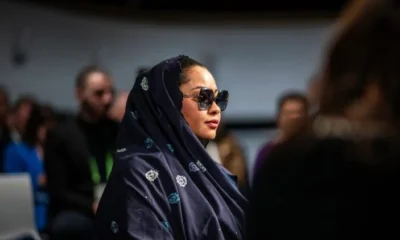
 BIG STORY5 days ago
BIG STORY5 days ago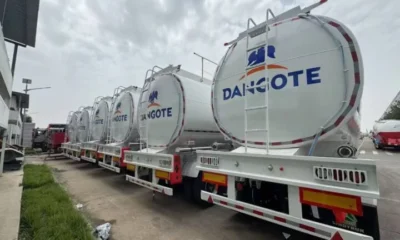
 BIG STORY3 days ago
BIG STORY3 days ago
 BIG STORY3 days ago
BIG STORY3 days ago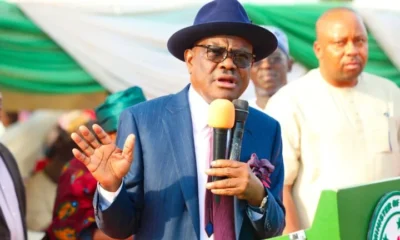
 BIG STORY5 days ago
BIG STORY5 days ago
 BIG STORY3 days ago
BIG STORY3 days ago
 BIG STORY3 days ago
BIG STORY3 days ago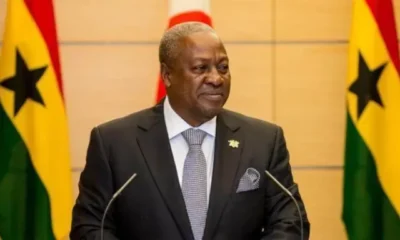
 BIG STORY4 days ago
BIG STORY4 days ago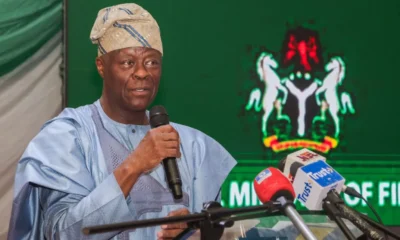
 BIG STORY5 days ago
BIG STORY5 days ago












